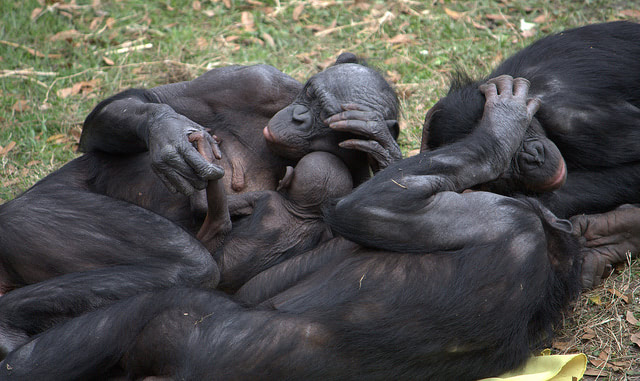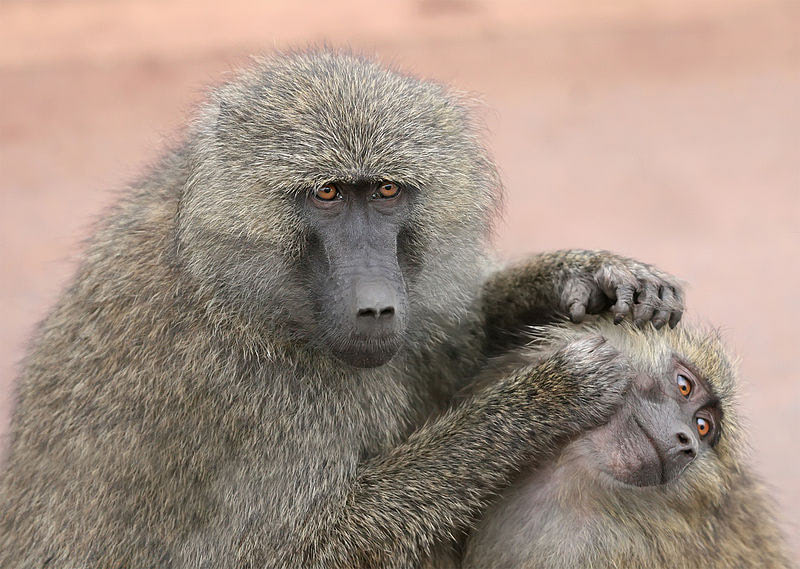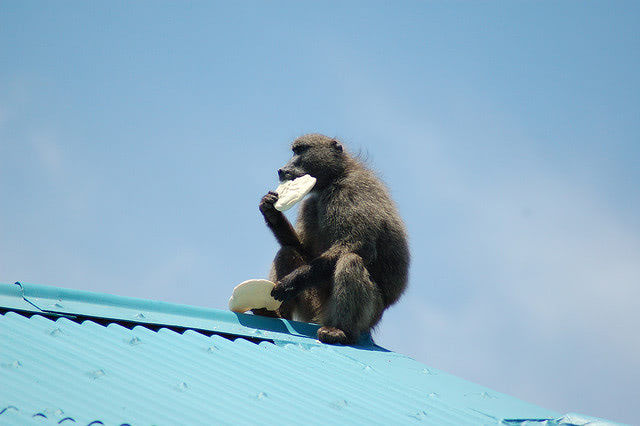While evidence indicates that humans domesticated themselves, we're not the only primates capable of self-domestication. Bonobos and baboons have shown they are just as capable of turning a kinder, gentler, and more cuddly culture into hardwired changes in their genomes.
Bonobos, aka the "sexy ape", look a lot like chimpanzees and share the same forest habitat. It stands to reason that they should be similar in most other regards, but the two species are wildly different. On a physical level, bonobos have smaller skulls and canine teeth, but their greatest differences lie in the social realm. Bonobos are the laid-back lovers compared to the chimpanzee's neurotic warmongers.
Bonobos spend more time playing and grooming than chimps. They have sex for just about any reason: so say hello, to solve conflicts, to celebrate finding food. A "bonobo handshake" is not how humans would want to start a business meeting. In the bonobo's reduced physical stature and playful spirit, researchers have recently recognized the same changes that occurred when wolves became dogs, or when aurochs became cattle. But while dogs needed humans for domestication, bonobos have done it all on their own.
What distinguishes bonobos from their chimp cousins is food availability. Duke University anthropologist Brian Hare argues that bonobos have gorillas, or their absence, to thank for their peaceful lives. One million to two million years ago, the newly formed Congo River split the proto-bonobo-chimps into two populations. The northern population had to compete with gorillas for scarce food. This created an aggressive, scheming culture that eventually lead to Machiavellian lifestyle of the modern chimpanzee. The lucky southern population got to keep all the leaves and fruits to themselves. This abundance of resources lead to a culture of happy-go-lucky apes that, over the course of a million years, evolved into today's bonobos.

If this process of speciation by culture seems far-fetched, a similar process has been underway for the last three decades in Kenya's savannah. In 1983, an outbreak of bovine tuberculosis lead to a permanent change in the social structure of a troop of olive baboons. The dominant males in the so-called Forest Troop were the only baboons aggressive enough to venture to the trash heap of a tourist lodge and fight over scraps of meat tainted with tuberculosis. Every last one of the troop's most aggressive members kneeled over dead from bad beef.
The survivors found themselves in something of a baboon utopia. Subordinate males and females were no longer subject to the violent moods and giant canines of the alphas. The Forest Troop spent more time grooming each other, and sat closer together when they were relaxing. The benefits extended all the way down to the most subordinate baboons, who showed significantly lowered levels of stress hormones.
This fascinating cultural shift has persisted for thirty years, even though aggressive, outsider males have continually moved into the troop. Though no active teaching takes place, the outsider males appear to learn the joys of non-violence all on their own, probably because females prefer to spend more time with companions that don't bite.

As of now, there's no evidence that the Forest Troop has changed genetically, or that it will persist given the pressure from other baboons. However, if the Forest Troop became geographically isolated, or if their culture could be transmitted to other troops, a million years or so might be sufficient to create a cuter, kinder monkey: the baboon version of the bonobo.
The case of the stress-free baboons may indicate that in the lack of savage competition for resources, highly social primates naturally gravitate towards what feels good. Maybe even early humans realized they'd rather spend their time talking, singing, and having recreational sex than ripping each other apart.
Photo by Lens Envy, LaggedOnUser, and Wikipedia.

Share your thoughts and join the technology debate!
Be the first to comment